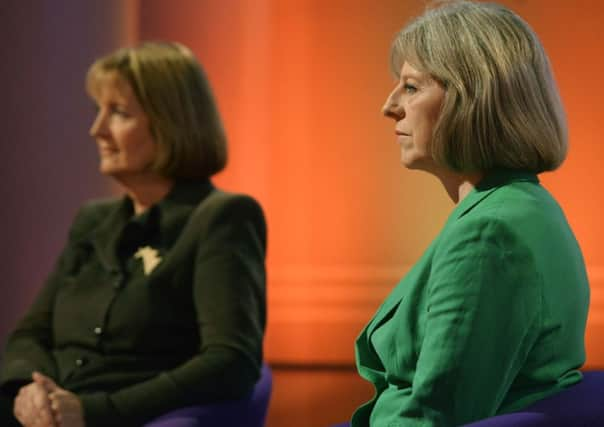David Maddox: May ready to lead women’s brigade


Leading this “monstrous regiment of women”, as John Knox would have put it, is the one mainstream party politician to come out of last week with her reputation much enhanced – the Tory Home Secretary Theresa May.
Mrs May has leadership ambitions that have not always been taken seriously. Yet she is the one leading figure who has consistently survived on the Tory front-bench since the party’s annihilation at the 1997 general election. Not only that, but the normally poisoned chalice of the Home Office has proven to be an elixir of life for her.
Advertisement
Hide AdAdvertisement
Hide AdHer speech to the Police Federation conference last week, where she humiliated and tore apart an organisation that has been the downfall of many of her predecessors, was the moment when she turned into a substantial politician and a serious contender to replace David Cameron, along with George Osborne and Boris Johnson.
While Mrs May may still be third favourite for the Tory crown, there is no doubt in Labour that her shadow, Yvette Cooper, will become leader of the Labour Party should Ed Miliband fail to win next year, a prospect looking more likely after last week’s poor results. Ms Cooper is rare in Labour in that she appeals to both Blairite modernisers and the traditional trade union left and is not as divisive as other contenders such as her better known husband Ed Balls, or Jim Murphy.
Noticeably Ms Cooper, along with Mr Balls, broke ranks last week and said the results “were not good enough”, heaping pressure on Mr Miliband.
The question of who replaces Nick Clegg as Lib Dem leader partly hinges on whether he can even survive this week after the appalling drubbing his party received at the polls. If he falls before the election, then the likely short-term successor is Vince Cable, the Lib Dem conscience on legs.
But if Mr Clegg ploughs on, then the next generation is more likely to emerge. From this generation the strongest candidate for many in the party is East Dunbartonshire MP Jo Swinson – if she can hold on to her seat. She also appeals to both sides of a party that has not had its troubles to seek recently, problems that have gone further than just the tension of coalition.
Add into the mix Nicola Sturgeon’s almost unchallenged position as Alex Salmond’s replacement to lead the SNP, and the dynamic of British politics could be set for a remarkable change in the next year or two.